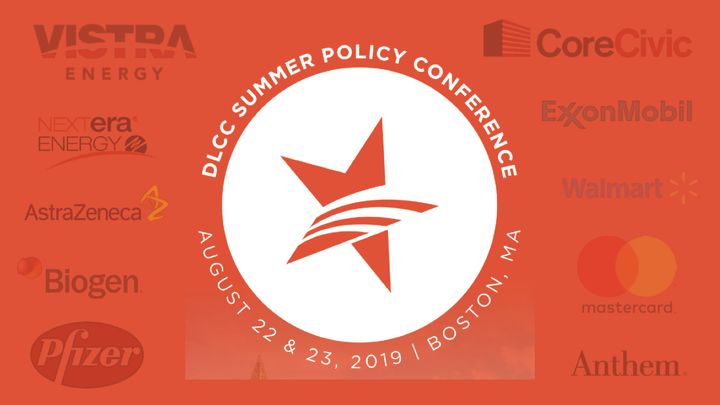In late August, Democratic state lawmakers from around the country gathered in Boston for the Democratic Legislative Campaign Committee’s (DLCC) Summer Policy Conference. The 40 legislators who attended were outnumbered by more than 140 lobbyists, most of them representing companies in industries such as oil, pharmaceuticals, insurance, and tech, according to documents obtained by the Energy and Policy Institute via a West Virginia Freedom of Information Act request.
The conference, which was closed to the press, was designed to give lobbyists face time with the legislators.
The companies and trade associations that sent lobbyists are all part of the DLCC’s Finance Council, as well as various other councils, depending on how much they donate. For $15,000, a corporation can join the DLCC Advisory Council. For $25,000, a business gets on the Leadership Council. $50,000 earns companies a spot on the Speakers Council. And for $100,000, a business can join the Chairs Council.
This is like a Democratic version of the American Legislative Exchange Council, providing high-paying special interests with access and influence over state Democratic officials.
Craig Holman, Public Citizen
The entities on the Finance Council that sent lobbyists to the August event combined to give nearly $2.5 million to the DLCC in the first half of 2019, according to tax records consulted by Sludge. The DLCC is a Democratic Party organization that works to elect state-level Democrats.
‘A Benefit Offered to Our Corporate Donors’
Donations to the DLCC not only buy companies and trade groups spots on the organization’s councils, but they afford them intimate meetings with state legislative leaders, during which they can “network…and have a chance to present to attendees on the critical issues facing states.” In August, the lobbyists got to have one-on-one meetings with lawmakers, “an important benefit that we offer to our Finance Council members,” according to an event overview memo.
An earlier version of the schedule disclosed by a West Virginia lawmaker includes a schedule for the one-on-one sessions. Lawmakers were assigned to tables where they could speak with lobbyists from companies including drugmaker Boehringer-Ingelheim and T-Mobile.
Attendees were provided with lists of all lobbyists and legislators, along with their headshots, who went to the event.
Many industries were represented at the event, but none were more prominent than the pharmaceutical industry. Dozens of lobbyists representing 22 drug companies, including AstraZeneca, Eli Lilly, and Pfizer, attended the conference.
States have passed a record number of laws reining in drug prices in 2019, most of which the pharmaceutical industry opposes. New measures include importing prescription drugs, screening for excessive price increases, and establishing oversight boards to set the prices that states pay for medications.
“The DLCC is not doing Democrats any favors by selling one-on-one access with state legislators to lobbyists and the corporate interests that hire them,” Craig Holman, an ethics lobbyist for good-government nonprofit Public Citizen, told Sludge.
“This is like a Democratic version of [the American Legislative Exchange Council], providing high-paying special interests with access and influence over state Democratic officials,” he said. “Nationwide, the Democratic party is trying to cast itself as the alternative to the scandal-ridden Trump Republican Party. Soirees like this run counter to that effort.”
Energy and Pharmaceutical Presentations
According to the program, the conference began on Aug. 22 with two short legislator-only events, followed by a policy session about preventing gun violence, which featured speakers from the gun control group Everytown for Gun Safety. Then lawmakers and lobbyists got together for a two-hour reception at the John F. Kennedy Library & Museum.
On Aug. 23, lawmakers attended a breakfast policy briefing about “retail electric choice” and featuring executives from electric and natural gas utility Vistra Energy and its subsidiary, TXU Energy. While Vistra does have renewable energy operations in its holdings, it also operates coal-fired power plants.
The one-on-one meetings lasted for 90 minutes and were followed by three policy sessions: a presentation by Walmart Director of Global Policy Sean Thurman; a diversity panel featuring ironworkers union representatives; and “The Future of Cancer Treatment” with speaker Michelle Sharr-McMahon, director of the oncology clinical program at drugmaker Celgene and a member of the Celgene PAC board.
Just before the conference, legislators had the opportunity to tour the global headquarters of Boston-based sports betting company DraftKings, which has been lobbying states to legalize sports gambling and allow people to use its fantasy sports platform.
Aside from Vistra Energy, lobbyist attendees represented oil giant ExxonMobil and fossil fuel-burning utility company NextEra Energy, as well as trade associations the American Fuel & Petrochemical Manufacturers and the Edison Electric Institute. States are updating their energy efficiency standards and electric grids, developments that energy companies would want to influence.
Two health insurance companies, Anthem and Blue Cross Blue Shield, had lobbyists at the conference, as did health care firms such as Fresenius Medical Care and Medtronic and trade groups including the American Academy of Dermatology.
Some state Democratic party organizations have banned contributions from private prisons, or banned such prisons altogether, but the DLCC has not. Major private prison company CoreCivic, a member of the DLCC Leadership Council, sent a lobbyist to the Boston event.
As states consider legislation restricting the sale of e-cigarettes and flavored vaping oil, two tobacco firms—Altria, which owns 35% of vaping company Juul, and Reynolds American—had lobbyist representation at the conference.
Pierce Haley, a partner at lobbying firm Selin Haley LLP, has lobbied on behalf of Koch Industries in Massachusetts and attended the conference.
Non-corporate, liberal-aligned interest groups such as NARAL Pro-Choice America and the Natural Resources Council Action Fund and unions including the American Federation of State, County and Municipal Employees (AFSCME) and the International Brotherhood of Teamsters had representatives in attendance, too.

